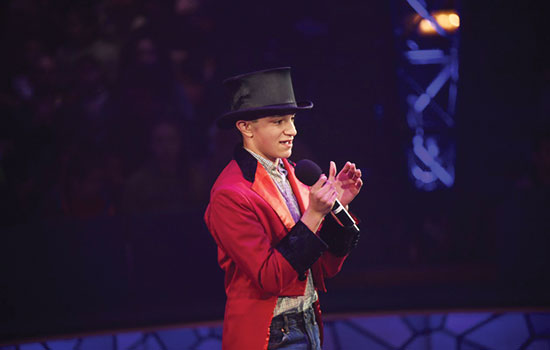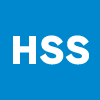
HSS Pediatric Orthopedic Surgeon Puts Balance in Teen’s Life
When 13-year-old Nicholas Vicinanza crossed the finish line last November, he was feeling great. He had just completed his town’s 5k in 33 minutes, about half the time it took him last year.
But what a year it had been.
Like the rest of his active family, Nicholas was always on the move: shooting hoops, playing with friends, spending time with his twin sister, Julia. But because he was born with cerebral palsy, which caused his left foot to turn inward, he struggled with balance. “It was harder to run faster,” he says. “It was hard to keep up with peers in my gym glass. I tripped over my feet a lot because my foot would turn in so much. If someone nudged me just a little bit, I’d fall really easily.”
Nicholas had been going to physical therapy nearly all his life, but he and his parents knew more was needed to fix his foot. His longtime physical therapist, Lynn Cataldo, introduced Nicholas and his family to Dr. David M. Scher, an associate attending pediatric orthopedic surgeon at the Hospital for Special Surgery Lerner Children’s Pavilion. Dr. Scher specializes in foot deformities and the care of children and teens with cerebral palsy.
Like Nicholas, Dr. Scher is no stranger to being active. A lifelong endurance athlete, he’s an accomplished runner and triathlete who runs or cycles through Central Park in the morning before work.
And also like Nicholas, Dr. Scher understands the value of teamwork. He approaches patient care holistically, often working closely with fellow surgeons, the hospital’s Leon Root, MD Motion Analysis Laboratory and the pediatric physical and occupational therapists with the CA Technologies Rehabilitation Center at the Lerner Children’s Pavilion, and the child’s family.
In fact, Dr. Scher says the relationship he’s able to form with patients and their families is especially rewarding for him. “It’s profound, because of the sensitivity of what you’re doing and the longevity of the relationship,” he explains. “You tend to care for kids for many years. That really channeled a lot of the essence of what I saw in being a doctor. The ability to have an impact in people’s lives, to have a long-term relationship — it feels good, rewarding. It’s one of the things that make this job so fun to do. It keeps me motivated.”
Forging that connection with the Vicinanzas was especially easy for Dr. Scher. “Nick is a charming, bright, personable guy, and I connected with him and his parents on a personal level,” he says. “They’re good people.”
For his part, Nicholas was confident he was in the right hands. “My parents and I knew we’d get feedback from a very talented doctor on what we thought would be best for me,” he says of his initial appointment with Dr. Scher. “We were definitely on board with that.”
After hearing all of Nicholas’ concerns, Dr. Scher ordered a brain MRI and a gait analysis to help him understand the exact nature of the teen’s cerebral palsy. He then mapped out the best treatment plan: Nicholas would undergo surgery to realign his left foot.
It sounds simple, but the three hour procedure involved lengthening the boy’s tightened left calf muscle, realigning the bones in his left foot, and cutting the tendon in two and moving one half to the other side of the foot.
During rehab, the body usually needs a full year to recover from such a surgery. But not surprisingly, Nicholas took the tough work in stride, first with physical therapists at the CA Technologies Rehabilitation Center, then later with his longtime therapist. “It hurt,” he admits, “but it was easy to get through knowing it would make me a better person physically, once I was done.”
“One thing I remember is how quickly he recovered,” Dr. Scher adds. “Nick has a very high tolerance for discomfort and doesn’t accept setbacks. He pushes through them. He was well ahead of what a typical kid would need to recover. Four months after the surgery, he was still using a cane a little bit. Seven months after, he ran a 5k.”
Running long distances isn’t in most teens’ rehab plans, but then again, most teens aren’t like Nicholas. “After the surgery, I was in a wheelchair, then on a walker and then a cane. I was eager to get back on my feet and be active again,” he explains. “This race had been going on in my town for a while, and I thought, now that I’m back on my feet, why not run it? I told my parents I wanted to do it, and they realized this was something I wanted to prove to myself.”
Nicholas has shown no signs of slowing down since then. Besides running the race again this past November, he joined the basketball and tennis teams and recently went on an eight mile hike in Upstate New York with his Boy Scout troop.
All of this is music to Dr. Scher’s ears. “My philosophy is, as kids get older and life gets busier, taking time out two or three days a week for hour long physical therapy sessions becomes less practical and less productive,” he says. “To the contrary, I love to see kids find things they enjoy doing that keeps them active. It’s important to maintain strength and flexibility, and more kids would prefer to do that outdoors or in the gym with their friends than hanging out with old people like me.” (That said, Dr. Scher does go the extra mile to help his patients to get up and get moving. This spring, for example, he and some colleagues took a group of young patients with cerebral palsy on an adaptive ski trip to Windham Mountain, in the Catskill Mountains.)
Meanwhile, these days Nicholas is pouring much of his energy into two of his new passions: acting and singing. He put his showmanship skills to the test last December when he served as Guest Ringmaster at HSS’s 8th Annual Big Apple Circus Benefit. “That was one of the best experiences of my life,” Nicholas says. Besides introducing circus acts, he also told the crowd of 1,500 how Dr. Scher and the Lerner Pavilion staff helped him and other patients like him. Although Nicholas’ active lifestyle was a plus during rehab, he’s quick to credit the hospital for enabling him to do everything he wants to do. “I couldn’t have done it without Dr. Scher and HSS,” he says.

